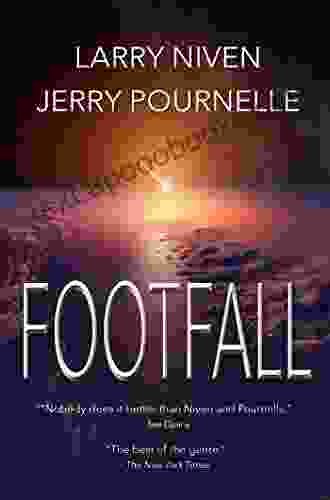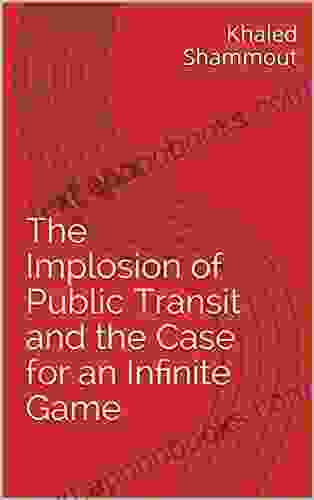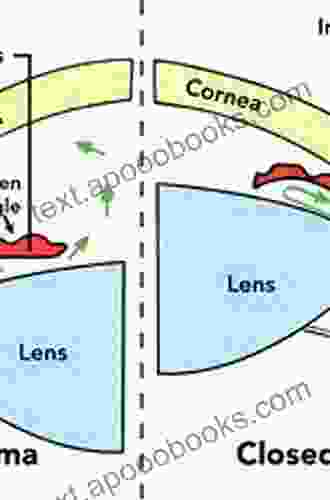The Implosion of Public Transit and the Case for an Infinite Game

Public transit is in crisis. Ridership is plummeting, fares are rising, and service is being cut. In many cities, public transit is seen as a last resort, only used by those who can't afford to drive. This is a far cry from the days when public transit was seen as a vital part of urban life.
5 out of 5
| Language | : | English |
| File size | : | 2407 KB |
| Text-to-Speech | : | Enabled |
| Screen Reader | : | Supported |
| Enhanced typesetting | : | Enabled |
| Print length | : | 78 pages |
| Lending | : | Enabled |
What has caused this decline? There are a number of factors, including the rise of the automobile, the decline of urban density, and the suburbanization of jobs. But perhaps the most important factor has been the way that public transit has been managed. For decades, public transit has been run like a business, with the goal of maximizing ridership and profits. This approach has led to a focus on short-term gains, such as cutting fares and increasing service during peak hours. But it has also led to a neglect of long-term investment, such as building new lines and improving infrastructure.
The result has been a system that is increasingly unsustainable, inequitable, and resilient. Unsustainable because it relies on ever-increasing ridership to stay afloat. Inequitable because it benefits those who live near transit lines and jobs, while leaving others behind. And resilient because it is vulnerable to disruptions, such as natural disasters and economic downturns.
In The Implosion of Public Transit and the Case for an Infinite Game, author Jarrett Walker argues that the traditional model of public transit is broken and that we need to adopt a new approach. Walker proposes an "infinite game" model of public transit, in which the goal is not to maximize ridership or profits, but to create a system that is sustainable, equitable, and resilient.
An infinite game is a game that has no end. It is played for its own sake, not for the purpose of winning or losing. The goal of an infinite game is to keep the game going. In the context of public transit, this means creating a system that is flexible, adaptable, and responsive to the needs of the community.
Walker argues that the infinite game model is the only way to save public transit. By focusing on long-term sustainability, equity, and resilience, we can create a system that meets the needs of the present and the future.
The Principles of an Infinite Game
Walker outlines four key principles of an infinite game:
- The goal is to keep the game going. This means creating a system that is flexible, adaptable, and responsive to the needs of the community.
- The players are all interconnected. This means that the actions of one player will affect all of the other players.
- The rules are constantly changing. This means that there is no one-size-fits-all solution to public transit. The system must be constantly adapted to meet the changing needs of the community.
- The outcome is uncertain. This means that there is no guarantee that public transit will be successful. But by playing an infinite game, we can increase the chances of success.
The Benefits of an Infinite Game
There are a number of benefits to adopting an infinite game model of public transit. These benefits include:
- Sustainability. An infinite game model is more sustainable than a traditional model because it focuses on long-term investment and resilience.
- Equity. An infinite game model is more equitable than a traditional model because it benefits all members of the community, not just those who live near transit lines and jobs.
- Resilience. An infinite game model is more resilient than a traditional model because it is flexible and adaptable to changing needs.
The Implosion of Public Transit and the Case for an Infinite Game is a must-read for anyone who is interested in the future of public transit. Walker provides a clear and concise explanation of the challenges facing public transit and offers a compelling vision for a new way forward. By adopting an infinite game model, we can create a public transit system that is sustainable, equitable, and resilient.
5 out of 5
| Language | : | English |
| File size | : | 2407 KB |
| Text-to-Speech | : | Enabled |
| Screen Reader | : | Supported |
| Enhanced typesetting | : | Enabled |
| Print length | : | 78 pages |
| Lending | : | Enabled |
Do you want to contribute by writing guest posts on this blog?
Please contact us and send us a resume of previous articles that you have written.
 Book
Book Novel
Novel Page
Page Chapter
Chapter Text
Text Story
Story Genre
Genre Reader
Reader Library
Library Paperback
Paperback E-book
E-book Magazine
Magazine Newspaper
Newspaper Paragraph
Paragraph Sentence
Sentence Bookmark
Bookmark Shelf
Shelf Glossary
Glossary Bibliography
Bibliography Foreword
Foreword Preface
Preface Synopsis
Synopsis Annotation
Annotation Footnote
Footnote Manuscript
Manuscript Scroll
Scroll Codex
Codex Tome
Tome Bestseller
Bestseller Classics
Classics Library card
Library card Narrative
Narrative Biography
Biography Autobiography
Autobiography Memoir
Memoir Reference
Reference Encyclopedia
Encyclopedia Melanie Lageschulte
Melanie Lageschulte Mark West
Mark West Valerie Bryan
Valerie Bryan L Q Murphy
L Q Murphy Matt Ridley
Matt Ridley Robin Melanson
Robin Melanson Remi Kanazi
Remi Kanazi Rolundus R Rice
Rolundus R Rice Lou Manzi
Lou Manzi Larry Feign
Larry Feign Raul Fattore
Raul Fattore Robin Marty
Robin Marty Richard D Parsons
Richard D Parsons Mark Steinberg
Mark Steinberg Vanessa Couchman
Vanessa Couchman Robert Juliano
Robert Juliano Walter Dick
Walter Dick Steve Malins
Steve Malins Tom Benford
Tom Benford William Alan Webb
William Alan Webb
Light bulbAdvertise smarter! Our strategic ad space ensures maximum exposure. Reserve your spot today!

 Ethan MitchellDeck the Halls with Cross Stitch: The Ultimate Santa Cross Stitch Pattern...
Ethan MitchellDeck the Halls with Cross Stitch: The Ultimate Santa Cross Stitch Pattern... Victor HugoFollow ·16.3k
Victor HugoFollow ·16.3k Foster HayesFollow ·5.7k
Foster HayesFollow ·5.7k George OrwellFollow ·18.7k
George OrwellFollow ·18.7k Wesley ReedFollow ·3k
Wesley ReedFollow ·3k Hector BlairFollow ·15.7k
Hector BlairFollow ·15.7k Ezekiel CoxFollow ·16.5k
Ezekiel CoxFollow ·16.5k Mark TwainFollow ·3.5k
Mark TwainFollow ·3.5k T.S. EliotFollow ·4.6k
T.S. EliotFollow ·4.6k

 Henry Wadsworth Longfellow
Henry Wadsworth LongfellowUnleash the Blues Spirit: Dive into "Blues Guitar Songs...
The captivating allure of the blues has...

 Ernesto Sabato
Ernesto SabatoBehind the Scenes with the Legends of Beauty
Unveiling the...

 Neal Ward
Neal WardUnleash the Infernal Power of "Lucifer's Hammer" by Larry...
A Cosmic Catastrophe that Will Ignite Your...

 Wesley Reed
Wesley ReedPetra Pecado: A Gripping and Unforgettable Journey...
Embark on a Captivating Adventure ...

 Phil Foster
Phil FosterStep into a World of Wonders: Footfall by Larry Niven - A...
Prologue: In the vast expanse of the...
5 out of 5
| Language | : | English |
| File size | : | 2407 KB |
| Text-to-Speech | : | Enabled |
| Screen Reader | : | Supported |
| Enhanced typesetting | : | Enabled |
| Print length | : | 78 pages |
| Lending | : | Enabled |












